1966 FIFA World Cup Final
The 1966 FIFA World Cup Final was a football match played at Wembley Stadium, London, on 30 July 1966 to determine the winner of the 1966 FIFA World Cup, the eighth FIFA World Cup.[1] The match was contested by England and West Germany, with England winning 4–2 after extra time to claim the Jules Rimet Trophy.
.jpg) Queen Elizabeth II presents England captain Bobby Moore with the World Cup trophy. | |||||||
| |||||||
| After extra time | |||||||
| Date | 30 July 1966 | ||||||
|---|---|---|---|---|---|---|---|
| Venue | Wembley Stadium, London | ||||||
| Referee | Gottfried Dienst (Switzerland) | ||||||
| Attendance | 96,924 | ||||||
| Weather | Sunny 23 °C (73 °F) | ||||||
It was the first – and to date only – occasion that England has hosted or won the World Cup.
The match is remembered for England's – as of 2020 – only World Cup and major international title, Geoff Hurst's hat-trick – the first and as of 2018 only one ever scored in a FIFA World Cup Final – and the controversial third goal awarded to England by referee Gottfried Dienst and linesman Tofiq Bahramov. The England team became known as the "wingless wonders", on account of their then-unconventional narrow attacking formation, described at the time as a 4–4–2.[2]
In addition to an attendance of 96,924 at the stadium, the British television audience peaked at 32.3 million viewers, making it the United Kingdom's most-watched television event ever.[3][4]
Road to the final
Both teams were strong throughout the tournament. Each won two and drew one of their three matches in the group stages. England did not concede a goal until their semi-final against Portugal.
| Round | ||||||||||||||||||||||||||||||||||||||||||||||||||||||||||||||||||||||||||||||||||||||||||||||
|---|---|---|---|---|---|---|---|---|---|---|---|---|---|---|---|---|---|---|---|---|---|---|---|---|---|---|---|---|---|---|---|---|---|---|---|---|---|---|---|---|---|---|---|---|---|---|---|---|---|---|---|---|---|---|---|---|---|---|---|---|---|---|---|---|---|---|---|---|---|---|---|---|---|---|---|---|---|---|---|---|---|---|---|---|---|---|---|---|---|---|---|---|---|---|
| Opponent | Result | Group stage | Opponent | Result | ||||||||||||||||||||||||||||||||||||||||||||||||||||||||||||||||||||||||||||||||||||||||||
| 0–0 | Match 1 | 5–0 | ||||||||||||||||||||||||||||||||||||||||||||||||||||||||||||||||||||||||||||||||||||||||||||
| 2–0 | Match 2 | 0–0 | ||||||||||||||||||||||||||||||||||||||||||||||||||||||||||||||||||||||||||||||||||||||||||||
| 2–0 | Match 3 | 2–1 | ||||||||||||||||||||||||||||||||||||||||||||||||||||||||||||||||||||||||||||||||||||||||||||
Group 1 winner
|
Final group standings | Group 2 winner
| ||||||||||||||||||||||||||||||||||||||||||||||||||||||||||||||||||||||||||||||||||||||||||||
| Opponent | Result | Knockout stage | Opponent | Result | ||||||||||||||||||||||||||||||||||||||||||||||||||||||||||||||||||||||||||||||||||||||||||
| 1–0 | Quarter-finals | 4–0 | ||||||||||||||||||||||||||||||||||||||||||||||||||||||||||||||||||||||||||||||||||||||||||||
| 2–1 | Semi-finals | 2–1 | ||||||||||||||||||||||||||||||||||||||||||||||||||||||||||||||||||||||||||||||||||||||||||||
Match
Summary
Normal time
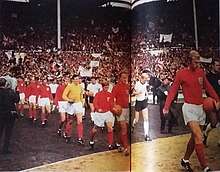
England, managed by Alf Ramsey and captained by Bobby Moore, won the toss and elected to kick off. After 12 minutes, Sigfried Held sent a cross into the English penalty area which Ray Wilson misheaded to Helmut Haller, who got his shot on target. Jack Charlton and goalkeeper Gordon Banks failed to deal with the shot which went in, making it 1–0 to West Germany.

In the 18th minute, Wolfgang Overath conceded a free kick, which Moore took immediately, floating a cross into the West German area, where Geoff Hurst rose unchallenged and levelled the scores with a downward glancing header. The teams were level at half-time, and after 77 minutes England won a corner. Alan Ball delivered the ball to Geoff Hurst whose deflected shot from the edge of the area found Martin Peters. He produced the final shot, beating the West German keeper from eight yards to make the score 2–1 to England.[5]
Germany pressed for an equaliser in the closing moments, and in the 89th minute Jack Charlton conceded a free kick for climbing on Uwe Seeler as they both went up for a header.[5] The kick was taken by Lothar Emmerich, who struck it into George Cohen in the wall; the rebound fell to Held, who shot across the face of goal and into the body of Karl-Heinz Schnellinger. The ball deflected across the England six-yard box, wrong-footing the England defence and allowing Wolfgang Weber to level the score at 2–2 and force the match into extra time. Banks protested that the ball had struck Schnellinger on the arm, and reiterated the claim in his 2002 autobiography,[6] but replays showed that it actually struck Schnellinger on the back.[5][7]
Extra time
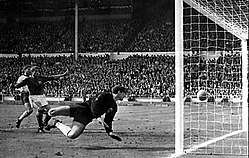
England pressed forward and created several chances. In particular, with five minutes gone, Bobby Charlton struck the post and sent another shot just wide. With 11 minutes of extra time gone, Alan Ball put in a cross and Geoff Hurst swivelled and shot from close range. The ball hit the underside of the crossbar, bounced down and was cleared. The referee Gottfried Dienst was uncertain if it had been a goal and consulted his linesman, Tofiq Bahramov from Azerbaijan in the USSR, who indicated that it was, and the Swiss referee awarded the goal to the home team. The crowd and the audience of 400 million television viewers were left arguing whether the goal should have been given or not. The crossbar is now on display in the Wembley Stadium.[8].
England's third goal has remained controversial ever since the match. According to the Laws of the Game the definition of a goal is when "the whole of the ball passes over the goal line".[9] English supporters cited the good position of the linesman and the statement of Roger Hunt, the nearest England player to the ball, who claimed it was a goal and that was why he wheeled away in celebration rather than attempting to tap the rebounding ball in. Modern studies using film analysis and computer simulation have shown that the whole ball never crossed the line – only 97% did. Both Duncan Gillies of the Visual Information Processing Group at Imperial College London and Ian Reid and Andrew Zisserman of the Department of Engineering Science at University of Oxford have stated that the ball would have needed to travel a further 2.5–6.0 cm to fully cross the line.[10] Some Germans cited possible bias of the Soviet linesman,[11] especially as the USSR had just been defeated in the semi-finals by West Germany.[12] Bahramov later stated in his memoirs that he believed the ball had bounced back not from the crossbar but from the net, and that he was not able to observe the rest of the scene, so it did not matter where the ball hit the ground anyway.
One minute before the end of play, the West Germans sent their defenders forward in a desperate attempt to score a last-minute equaliser. Winning the ball, Bobby Moore picked out the unmarked Geoff Hurst with a long pass, which Hurst carried forward while some spectators began streaming onto the field and Hurst scored moments later. Hurst later admitted that his blistering shot was as much intended to send the ball as far into the Wembley stands as possible should it miss, in order to kill time on the clock.[13]
The final goal gave rise to one of the most famous calls in English football history, when BBC commentator Kenneth Wolstenholme described the situation as follows:
"And here comes Hurst. He's got... some people are on the pitch, they think it's all over. It is now! It's four!"[14]
One of the balls from the final is on display in the National Football Museum in Manchester.
Details
| England | 4–2 (a.e.t.) | |
|---|---|---|
| Report |
England
|
West Germany
|
|
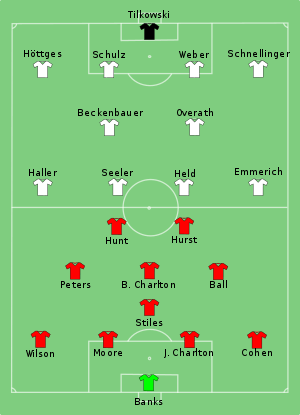 |
| |||||||||||||||||||||||||||||||||||||||||||||||||||||||||||||||||||||||||||||||||||||||
|
Officials
|
Match rules
|
Aftermath
Champions photograph and statue
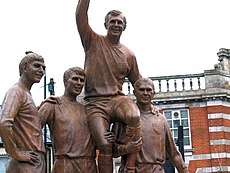
One of the enduring images of the celebrations in Wembley immediately after the game was the picture of the captain Bobby Moore holding the Jules Rimet Trophy aloft, on the shoulders of Geoff Hurst and Ray Wilson, together with Martin Peters. In recognition of Moore and other West Ham United players' contribution to the win, the club and Newham Borough Council jointly commissioned a statue of this scene. On 28 April 2003 Prince Andrew as president of The Football Association, duly unveiled the World Cup Sculpture (also called The Champions) in a prominent place near West Ham's ground, at the time, the Boleyn Ground, at the junction of Barking Road and Green Street. The 4-metre (13 ft)-high bronze piece was sculpted by Philip Jackson and weighed 4 tonnes.[15][16]
Cultural impact
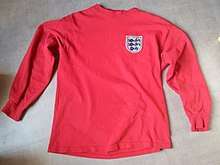
.jpg)
The final is the most watched event ever on British television, as of July 2018, attracting 32.30 million viewers.[3] In Germany, a goal resulting from a shot bouncing off the crossbar and hitting the line is called a Wembley-Tor (Wembley Goal) due to the controversial nature of Hurst's second goal. This goal has been parodied a large number of times. Some of the most notable include:
- England's third goal was referenced in a 2006 Adidas advertisement, where English midfielder Frank Lampard takes a shot at German keeper Oliver Kahn, and a similar event happens. On 27 June 2010 at that year's World Cup a similar goal by Lampard was wrongly disallowed (TV replays showed the ball landing past the goal line before bouncing away) which would have levelled the second-round game against Germany 2–2 (Germany won 4–1).
- Kenneth Wolstenholme's commentary on the third goal that bounced on the line, "It's a goal!" was used (along with the sound of breaking glass) in the tape-looped coda of an early version of The Beatles song "Glass Onion", available on the album Anthology 3.[17]
In August 1966 a special 4d stamp marked ENGLAND WINNERS was issued by the Royal Mail to celebrate the victory and which soared in value to up to 15 shillings each on the back of public enthusiasm for the victory before falling back in value when the public realised it was not rare.
The 1991 BBC miniseries Sleepers, about a pair of deep-cover KGB agents placed in England in the mid-1960s and then forgotten includes a subplot about an archive film of the match recorded by Soviet agents and then placed in archives. A KGB officer who sees the film in the early 1990s is excited to discover it includes footage of the disputed goal and attempts to sell it to a contact at a television network (pointedly described as not the BBC). Sleepers is coy about what the film depicts and in the course of the story, the film is destroyed.
Marking the 50th anniversary of England's World Cup victory in July 2016, ITV broadcast 1966 – A Nation Remembers, which was narrated by the actor Terence Stamp who attended every England game at the tournament.[18]
The World Cup win features in the song "Three Lions" (known by its chorus "Football's Coming Home"), the unofficial anthem of the England football team.[19] England's win in the final also helped fans to create the "Two World Wars and One World Cup" chant.[12]
The match features in the fifth episode of season 5 of American period drama Mad Men, with one of the characters watching and celebrating the game in a pub.
2009 receipt of winners medals
The players and staff of England's winning squad who did not get medals in 1966 received them on 10 June 2009 after a ceremony at 10 Downing Street in London. Initially, only the 11 players on the pitch at the end of the match received medals, but FIFA later awarded medals to every non-playing squad and staff member from every World Cup-winning country from 1930 to 1974.[20]
References
- "Hurst the hero for England in the home of football". FIFA. Retrieved 11 November 2014
- "Alf Ramsey – England's Anonymous Hero". FIFA. Retrieved 28 January 2013.
- "Tracking 30 years of TV's most watched programmes". BBC. Retrieved 2 February 2015
- "A riot of colour, emotion and memories: the World Cup stands alone in the field of sport". The Independent. Retrieved 20 August 2018.
- Smyth, Rob; Murray, Scott (30 May 2014). "World Cup final 1966: England v West Germany – live!". The Guardian. Guardian News and Media.
- Banks, Gordon (2002). Banksy. Penguin Books. p. 136. ISBN 978-0-7181-4582-8.
- Glanville, Brian (2010) [1973]. The Story of the World Cup. London: Faber and Faber. p. 154. ISBN 978-0-571-23605-3.
- "Team Spirit Gains England the cup". Glasgow Herald (Page 4). 1 August 1966. Retrieved 30 April 2014.
- "Law 10 – The Method of Scoring". FIFA. Archived from the original on 23 May 2007. Retrieved 31 January 2019.
- Reid, Ian; Zisserman, Andrew (1996). Cipolla, R.; Buxton, B. (eds.). "Goal-directed Video Metrology" (PDF). Proceedings of the 4th European Conference on Computer Vision. New York City: Springer. II: 647–658. LNCS 1065. Archived from the original (PDF) on 2 March 2012. Retrieved 19 May 2012.
- Ken Jones (4 December 1997). "Football: It is possible to forget that England's overall World Cup record is nothing much to shout about". The Independent. Retrieved 21 June 2012.
- Lister, Graham (26 June 2010). "Two World Wars, One World Cup And The 'Achtung!' Chaos – The Complex And Violent History of England Vs Germany". Goal.com. Retrieved 21 June 2012.
- "1966: England – Federal Republic of Germany". Archived from the original on 8 February 2007. Retrieved 7 March 2013.
- "Class of '66 pay tribute to voice of football". The Daily Telegraph. 26 March 2002.
- "World Cup tribute unveiled". BBC News. 28 April 2003. Archived from the original on 3 February 2006. Retrieved 5 May 2010.
- "Champions Sculpture". newham.com. Archived from the original on 10 June 2015. Retrieved 15 August 2016.
- Anthology 3 – The Beatles
- "1966 – A Nation Remembers". ITV. 5 October 2016.
- "'It's coming home': England are winning the meme World Cup". The Guardian. 5 July 2018. Retrieved 7 July 2018.
- "World Cup 1966 winners honoured". BBC News. 10 June 2009. Archived from the original on 12 June 2009. Retrieved 10 June 2009.